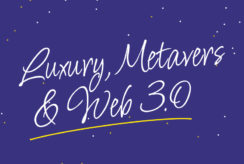Modernization and personalization: a must to address new client habits
For Luxury companies, providing a personal and unique experience is the key to ensuring client loyalty and increasing their lifetime value.
Interacting directly with clients via sales advisors has long been a hallmark of the industry. However, the globalization of clients, the impact of the sanitary crisis, and advancements in technology have profoundly shaped consumer habits and heightened their expectations concerning brand experiences.
According to a 2023 statistical study by Wavestone on the new luxury customer buying habits, clients are now expecting much more than a simple purchase. They demand a holistic, personalized and customizable experience, where digital plays an essential role in the entire customer journey and experience. These expectations, which are very different from those of the past, are due, among other things, to the existence and influence of this generation born with the Internet, the “digital natives”.
The 1-to-1 client relationship management must be modernized to address the challenges of these new consumer habits:
- To provide a consistent, coherent, and seamless experience across all channels (online and/or offline) and in every country.
- To capture and capitalize on client data to ensure personalization and continuity of experience while complying with current compliance regulations.

Elise Ducret
Global Retail Transformation Director
L’Oréal Luxe
Clienteling is strategic for l’Oréal Luxe because it is a key leverage of unique customer knowledge, enabling each Beauty Advisor to provide a personalized recommendation and build long-term customer loyalty, whatever the purchasing channel.
Elevating 1-to-1 client experience with agile and continuous evolution
To meet these challenges and offer customers in this sector a targeted, seamless 360° experience, companies will need to engage in long-term transformations impacting their organization transversally.
Evolution and creation of new processes to connect digital and physical experiences, to capture and provide relevant customer data at the right time, and to support new personalized services.
Evolution of many jobs (sales advisors, client relation managers, etc.) and teams’ upskilling.
Optimization of data collection, Establishment of international data governance, and ensuring compliance with regulations.
Evolution of tools supporting the 1-to-1 relationship with clients.
The road to market can appear long and difficult. That’s why, we recommend to our customers that they tackle the roadmap with an agile project management mindset, based on 2 main axes:
- Build and roll-out a minimum viable client 1-to-1 modern experience within the framework of the current company situation.
- Continuously evolve and enrich this experience with the new version of the tool and the project.
The benefit of this approach is to address part of the modern 1-to-1 relationship challenges early and build the ideal client experience through a test and learn process with your clients and field teams.
1-to-1 relationship success hinges on measuring performance
As the modernized 1-to-1 client relationship becomes a global and international model, the importance of monitoring the aspects of this service will increase to ensure:
- The client experience is delivered as intended:
Measured by operational KPIs such as adoption, usage of tools, or the status of any in-store device. - The business goals are reached, and the experience is viable:
Measured through business KPIs such as conversion rate, average order value or items per transactions compared to the classic experience.
We would like to thank: Alexis Tourtet, Kenza El M’Hamdi et Kawai Kui.





